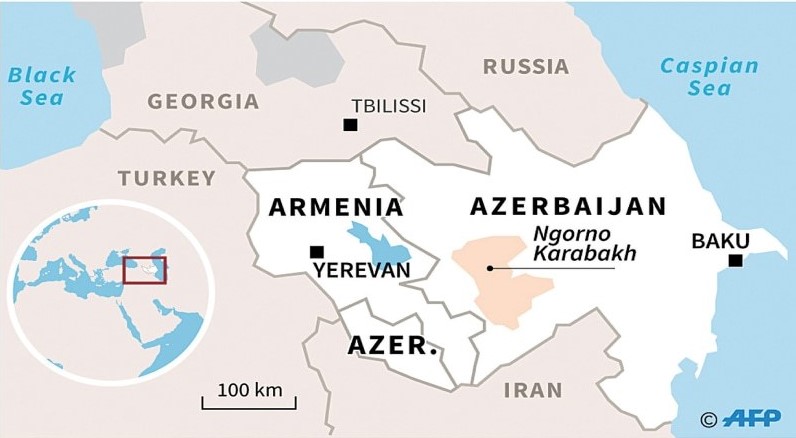The military stalemate that started between Armenia and Azerbaijan in late September 2020 has turned into a center of attention for the Caucasus region turning in the eyes of Russia and Turkey in it. On September 27 2020, both Armenian and Azeri forces opened fires at each other in the contested Nagorno-Karabakh region and the clashes have escalated ever since. Both sides have blamed each other for attacking their civilian and military targets.
Sporadic shelling by Azerbaijan has turned the city of Stepanakert into a ghost town, claims Armenia whereas Azerbaijan has accused Armenia of attacking and shelling civilian targets in urban areas, including its second largest area of Ganja. Armenia has claimed more than 300 deaths among its troops but Azerbaijan has not given any military death count on their side so far.
Karabakh’s rights ombudsman Artak Beglaryan told the AFP on 7th October 2020 and the Guardian quoted it as, “According to our preliminary estimates, some 50% of Karabakh’s population and 90% of women and children – or some 70,000-75,000 people – have been displaced”.
The latest advancement in this rift is Armenia’s missile attacks on the important oil and gas export routes to Europe from Azerbaijan on late 6th October 2020. These routes are the ones on which the most important gas projects of the Caucasus region lie. Azeri State Oil Company Socar’s spokesperson Ibrahim Ahmadov issued a statement on October 7th 2020 in which he said.
“Missiles fired by the Armenian forces landed close to the Baku-Tbilisi-Ceyhan (BTC) oil line and the South Caucasus gas pipeline, north of the disputed Nagorno-Karabakh region. But neither of the pipelines were damaged and the normal flow was continuing through both” as per the report of S&P Global.
The South Caucasus Pipeline (SCP), the Shah Deniz II project, the Trans Anatolian Pipeline (TANAP) and its final portion Trans Adriatic Pipeline (TAP) are all near their completion. The BTC, SCP, TANAPT AND TAP pipelines are scheduled to start operationalizing from November 2020. These gas pipeline projects are a sensitive area now amid the rift between Armenia and Azerbaijan because the conflict zone lies just 30-40 km from the BTC and SCP pipelines. Both of these pipelines lie around the sensitive break-away regions of Georgia and Azerbaijan. The $40 billion Southern Gas Pipeline project under Azerbaijan is supported by the European Union (EU) and the US both of which want to drift the European supplies away from Russia.
The conflict has brought in both the regional as well as international community to its attention. Turkey has been on Azerbaijan’s support both because of the Muslim brotherhood and its pipeline projects with Azerbaijan which are highly beneficial for Turkey. Azerbaijan has already supplied 7 billion cubic meter gas to Turkey via TAP and Turkey’s energy imports have increased by 25.3% as compared to last year. Turkey has reportedly sent the pro-Ankara Syrian militants to nurture the Azeri forces and some house-based drones which have already been successful in Libya and Syria. According to the UK-based observatory for Human Rights, Turkey has sent around 1,200 troops to Azerbaijan’s support out of which 64 have already died. The Turk Foreign Minister Mevlut Cavusoglu stated on 6th October 2020 that.
“The world should back Azerbaijan as the side of those who are right. Armenia is the occupier in this conflict”
The French foreign minister Jean-Yves Le Drian said on Tuesday 6th October 2020 that, “Turkey’s backing of Azerbaijan risks the fueling of the internationalization of this conflict. Azerbaijan initiated the current conflict and it has lamented the large number of civilian victims for the sake of meagre progress on the ground”.
The South Asian Nuclear neighbors India and Pakistan have expressed their share of views in this regards. Certain Indian median reports alleged that Pakistan’s military has sent its troops to Azerbaijan and they have been fighting alongside the Azeri forces in the Nagorno-Karabakh region.
However, Pakistan’s foreign ministry issued a statement on 2nd October 2020 saying, “Any such reports related to the presence of Pakistan’s army in Azerbaijan are irresponsible, speculative and baseless. The intensive shelling by Armenian forces on civilian populations of Azerbaijan is reprehensible and most unfortunate. This could compromise peace and security of the entire region. Armenia must stop its military action to avoid further escalation”.
Iran has warned that the fighting between Armenia and Azerbaijan could escalate into a wide-ranging regional conflict. The Iranian president Hassan Rouhani came out on Wednesday 7th October 2020 issuing a statement on the conflict in which he said.
“We must be attentive that the war between Armenia and Azerbaijan does not become a regional war. Peace is the basis of our work and we hope to restore stability to the region in a peaceful way”.
The biggest concerned state in the Armenian Azeri conflict is Russia. Russia has amicable relations with both of its previous Soviet bloc’s Armenia and Azerbaijan. However, Russia’s ambitions to expand its gas pipeline capacity throughout Europe are under risk because of Azerbaijan’s ongoing projects with Turkey, backed by EU and the US. And Russia has no good relations with turkey because of certain past crises and their differential opinions on Syrian conflict. Russia could be the second most affected state after Armenia-Azerbaijan if the conflict continues to escalate because its economy has suffered immensely due to the Covid-19 pandemic and it has adversely affected its oil and gas demands from Europe. Russia sells arms and ammunitions to both Armenia and Azerbaijan. But it has a military base in Armenia and Armenia is the member of a Russian-led regional security group whereas Azerbaijan is not a part of it.
Russian president Vladimir Putin has called both countries for negotiations and the Azeri foreign minister; Jeyhun Bayramov has finally accepted the offer of dialogue from Russia and would meet with the leaders of the Organization for Security and Co-operation in Europe’s Minsk Group which is jointly ventured by France, Russia and the United States.
A ceasefire between Armenia and Azerbaijan is extremely crucial for Russia because not only does it need to curb Azeri growing relations with Turkey which is a threat to Russia’s pipeline supplies across Europe but it could also put its dream of the regional domination to sleep forever.

The author is doing M. Phil in Public Policy and Governance. He is working as a freelancer. Previously worked with HubPages and Washington Post.
